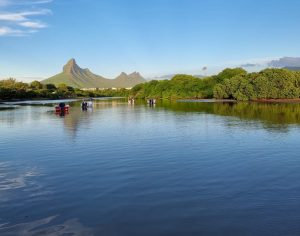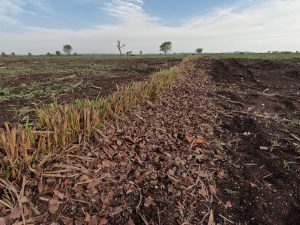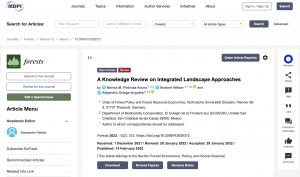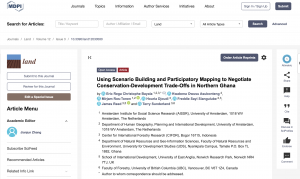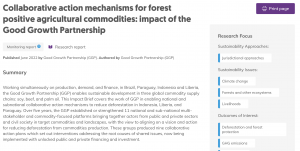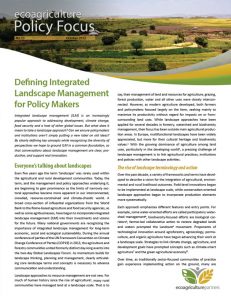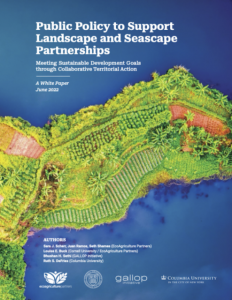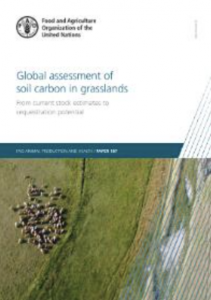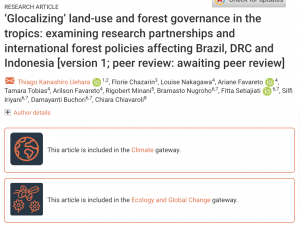Category: Knowledge
From Ridge to Reef
On the island of Mauritius, home to some of the world's most diverse and ecologically important forests and ecosystems, the Ridge to Reef (R2R) project is restoring and increasing native forest cover. In early 2023, members of our Central Component visited on a learning mission.
A Line in the Sand
Could a long line of grass hedge against erosion? An integrated landscape management project in Zimbabwe is proving that it might.
A Knowledge Review on Integrated Landscape Approaches
Holistic and multi-transdisciplinary approaches, where multiple goals are achieved in order to improve resilience in societies and ecosystems in the short, medium, and long term, are ideal, even utopian. Hence, science has come together with practical experiences that highlight the importance of working at a ‘landscape’ level.
Using Scenario Building and Participatory Mapping to Negotiate Conservation-Development Trade-Offs in Northern Ghana
In multifunctional landscapes, expanding economic activities jeopardise the integrity of biodiverse ecosystems, generating conservation-development trade-offs that require multi-stakeholder dialogue and tools to negotiate conflicting objectives. Despite the rich literature on participatory mapping and other tools to reveal different stakeholder perspectives, there is limited evidence on the application of such tools in landscape-scale negotiations.
Collaborative action mechanisms for forest positive agricultural commodities: impact of the Good Growth Partnership
Working simultaneously on production, demand, and finance, in Brazil, Paraguay, Indonesia and Liberia, the Good Growth Partnership (GGP) enables sustainable development in three global commodity supply chains: soy, beef, and palm oil. This Impact Brief covers the work of GGP in enabling national and subnational collaborative action mechanisms to reduce deforestation in Indonesia, Liberia, and Paraguay.
Defining Integrated Landscape Management for Policy Makers
This brief lays out and explains the five critical elements of integrated landscape management, particularly where agriculture is an important land use, and illustrates the importance and background of the approach.
Public Policy to Support Landscape and Seascape Partnerships
Governments have recently launched major policy initiatives to address the multiple urgent land and resource challenges facing their countries: food and water insecurity, climate change, land degradation, biodiversity loss and the threats to health and livelihoods in the context of a global pandemic. A promising strategy is to work through multi-stakeholder Landscape and Seascape Partnerships.
Global assessment of soil carbon in grasslands
Soils contribute to the achievement of the UN Sustainable Development Goals through carbon sequestration. By enhancing soil health and fertility, soils can play a crucial role in climate action, land degradation neutrality, and alleviating hunger. The present study provides a spatially explicit report on the state of grassland soils and can be used as a baseline for future work to explore the impacts of livestock management on soil carbon at regional, country and farm levels. Assessing the current state of grassland systems and their potential to sequester carbon in the soil is of key importance to understand the trade-offs between grassland services on food security, biodiversity conservation and climate mitigation.
‘Glocalizing’ land-use and forest governance in the tropics: examining research partnerships and international forest policies affecting Brazil, DRC and Indonesia
This paper tackles both the framing and effectiveness of transnational initiatives affecting forest lands and peoples in the Global South, and the quality of relationships between institutions in the Global North and the Global South. Through more equitable research partnerships, this paper draws lessons from case studies in Indonesia (legality verification system in different forest property regimes), the Democratic Republic of the Congo (lifting of a moratorium on new logging concession), and Brazil (FSC in the Amazon region and the Amazon Fund).
Social change more important than physical tipping points
Limiting global warming to 1.5 degrees Celsius is currently not plausible, as is shown in a new, central study released by Universität Hamburg’s Cluster of Excellence “Climate, Climatic Change, and Society” (CLICCS). Climate policy, protests, and the Ukraine crisis: the participating researchers systematically assessed to what extent social changes are already underway – while also analyzing certain physical processes frequently discussed as tipping points.


